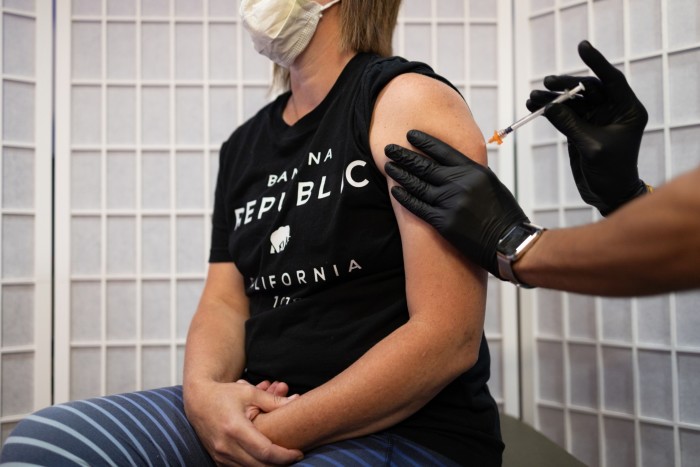The new chief executive of Novavax has urged governments to honour Covid-19 vaccine purchase commitments as the once high-flying US biotech battles to stay afloat amid a collapse in demand for jabs.
John Jacobs told the Financial Times there was no guarantee governments would deliver on all their existing commitments with the company, which include $2.1bn in advanced purchase agreements signed with the US biotech group stretching into 2025.
“We had to invest billions . . . to deliver a vaccine that helped to stem the tide of a global pandemic that was killing millions of people,” said Jacobs, who replaced Stan Erck as Novavax’s chief executive in January.
“And then to all of a sudden say: ‘Well you spent all your money, you committed to protect our citizens. Now we don’t think we need it as much. Sorry, you’re out of luck.’ That’s probably not good for long-term relationships and that type of thing and to benefit public health,” he said.
Novavax is one of a handful of vaccine makers, along with BioNTech/Pfizer and Moderna, which are approved to supply Covid jabs in the US, EU and other western countries. All providers are facing steep falls in sales due to weak demand, which is contributing to a supply glut that has left billions of vaccine doses unused.
This has prompted governments to renegotiate billions of dollars of supply contracts with manufacturers, a move that analysts warn could pile further pressure on cash-strapped Novavax.
“The drive to renegotiate agreements is not unique to Novavax but they are more pressed against a wall because of their difficult financial situation,” said Brendan Smith, analyst at Cowen, an investment bank.
Novavax said in December it would repay the UK government $112.5mn following its decision not to exercise an option in its contract to buy additional vaccine doses. The company also faces a $700mn arbitration process linked to its cancellation of a vaccine contract with Gavi, an international body providing vaccines to poor countries.
Novavax’s market capitalisation soared above $20bn when it developed Nuvaxovid, a Covid jab made using a traditional protein-based vaccine process rather than the messenger RNA technology used by BioNTech/Pfizer and Moderna. But the 36-year-old company’s valuation has since crashed below $1bn, due to delays in launching the vaccine, tough competition from rivals and weak demand for Covid jabs.
Novavax warned in February that there was “substantial doubt” about its future and Jacobs recently detailed plans to slash costs by up to 50 per cent and reduce the company’s 2,000-strong workforce by a quarter.
Novavax’s cash reserves fell to $637mn at March 31, down from $1.3bn at the end of December. Current liabilities are almost $2bn, which include the Gavi arbitration process.
Jacobs said he was prioritising cutting costs, developing and launching an updated version of its jab in time for the autumn vaccination season and meeting revenue guidance of between $1.4bn and $1.6bn in 2023.
He said most partners were moving to protect long-term relationships with the biotech industry in the knowledge that the next pandemic could be “right around the corner”.

Jacobs said Novavax expected to deliver on the $800mn advanced purchase agreements with the EU, Australia, Canada and New Zealand, which are due for delivery this year. He added that the company was negotiating with some customers about amending 2024 and 2025 purchase agreements, which could result in changes to delivery schedules and, in some cases, accelerated upfront payments to Novavax.
Roger Song, analyst with Jefferies, said any renegotiation sought by countries due to the current vaccine supply glut posed a risk to Novavax. But it could also provide some near-term benefits in terms of cash flow, citing a $100mn payment paid this quarter in relation to a renegotiated purchase agreement.
“Countries can renegotiate but they will probably need to pay a portion of their contracts to compensate Novavax,” said Song.
The EU is renegotiating its vaccine contract with BioNTech/Pfizer, which has raised concerns among rivals that it could push them out of the lucrative market. Details of a draft deal reported by the FT suggest that BioNTech/Pfizer could supply as many as 70mn doses a year until 2026, leaving little room for Novavax, Moderna or Sanofi.
Jacobs said policymakers had a strong desire to maintain diversity in the Covid jab market by ensuring there was an alternative to the mRNA jabs provided by BioNTech/Pfizer and Moderna. Novavax was working closely with regulators to ensure market access, and so that it could update its vaccine to target new Covid strains in time for the autumn, he said.
“Imagine if we get a pathogen where that [mRNA] product somehow can’t work as well as we would expect it to. And you don’t have diversity and tools, and even enough volume to support people in countries that don’t have the money that we’re fortunate enough to have in the United States and western Europe,” he said.
Jacobs said he had no regrets about joining Novavax at a time when it was struggling. “To me it seemed like a great opportunity for a turnround.”







